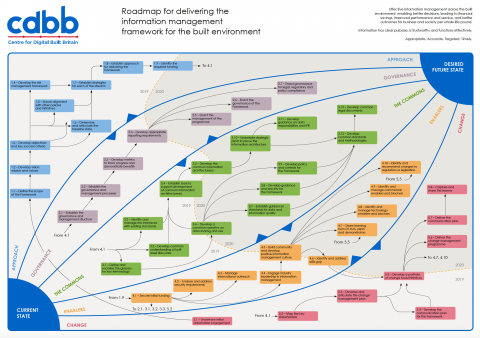The Centre for Digital Built Britain has published one of the key deliverables of the DFTG: The Roadmap to the Information Management Framework for the Built Environment (the Framework), that will enable the development of the National Digital Twin (NDT).
[https://doi.org/10.17863/CAM.38227 - download or change browser if interactive features do not work]
The Roadmap is intended to set out how the Framework should be delivered. In particular, it shows how the key building blocks of the Framework will fit together to enable effective information management across the built environment.

Figure 1: Enablers of the NDT
Delivering the Framework is a considerable challenge and requires industry alignment and a number of key issues to be addressed. In order to make the delivery of the Framework more manageable, the Roadmap has been broken down into five streams of interconnected components.
The Roadmap includes a description of what each component is, descriptions of what needs to be done to put each component in place, their dependencies and timescales, the outline of the costs, and an indication of the relevant stakeholders. Put simply, the Roadmap shows the prioritised route for the delivery of the Framework. The Gemini Principles and the Roadmap form the two key enablers for the delivery of the NDT.
|
Click on the roadmap image below and download the interactive pdf (the interactive features work best in Adobe). NOTE: The interactive viewing works best in Adobe. As an alternative for mobile devices or online viewing please click here, but please note that some features may not work. |
Key streams of the roadmap:
Approach stream
To set up coordinated and aligned activity across the whole NDT programme which will deliver the framework and the benefits of effective information management in the built environment.
Learn more: (link to blog/news)
Approach Stream Lead, Miranda Sharp, Ordnance Survey
Contact: ndtprogramme@cdbb.cam.ac.uk
Governance stream
To establish the structures and processes for managing the framework through three phases of development, adoption and (sector specific) ongoing oversight.
Learn more: (link to blog/news)
Governance Stream Lead, Paul Campion, TRL
Contact: ndtprogramme@cdbb.cam.ac.uk
The Commons stream
To develop the necessary support for effective information management via guidance, specifications and standards. Taking a “minimum viable” approach to the development of national-level framework resource for effective information management in the built environment.
Learn more: (link to blog/news)
The Commons Stream Lead, James Hetherington, Alan Turing Institute
Contact: ndtprogramme@cdbb.cam.ac.uk
Enablers stream
Designing and delivering a prioritised and proactive programme enable the changes required for the adoption of the information management framework and compliant digital twins.
Learn more: (link to blog/news)
Enablers Stream Lead, to be announced soon.
Contact: ndtprogramme@cdbb.cam.ac.uk
Change Stream
To facilitate adoption of the framework across the whole ecosystem of the built environment, particularly amongst the early adopters and early majority of both twins and the framework.
Change Stream Lead Nicola Pearson, CDBB
Contact: ndtprogramme@cdbb.cam.ac.uk
Digital Framework Task Group
The Centre for Digital Built Britain’s Digital Framework Task Group (DFTG) was launched by HM Treasury in July 2018. It reports to HM Government through the CDBB Strategic Advisory Board. The overarching purpose of the DFTG is to steer and guide the successful development and adoption of the “Information Management Framework for the Built Environment”.
The creation of the framework forms an integral part of HM Government’s modern Industrial Strategy and Construction Sector Deal. The framework will establish the building blocks to enable effective information management across the built environment and will pave the way for the development of the national digital twin. The DFTG is made up of senior leaders within the landscape and is chaired by Mark Enzer, Chief Technical Officer of Mott MacDonald.
Definitions
-
Digital twin - A realistic digital representation of something physical.
-
National digital twin - An ecosystem of digital twins connected via securely shared data.
-
Information management framework - Enabling effective information management across the built environment.
-
Gemini Principles - Values to guide the development and use of the information management framework and the NDT.
| Mark Enzer (Chair) | Mott MacDonald |
| Alexandra Bolton | Centre for Digital Built Britain |
| Charles Boulton | Independent Consultant |
| Dan Byles | Living PlanIT |
| Al Cook | Independent Consultant |
| Leigh Dodds | Open Data Institute |
| Peter El Hajj | Mott MacDonald |
| Emily Keaney | UK Regulators’ Network |
| Anne Kemp | Atkins/UK BIM Alliance/BuildingSMART |
| Chara Makri | Centre for Digital Built Britain |
| Seema Mistry | FCA |
| Richard Mortier | Centre for Digital Built Britain |
| Sarah Rock | Gowling WLG/BIM4Legal |
| Jennifer Schooling | Centre for Digital Built Britain |
| Simon Scott | KBR |
| Miranda Sharp | Ordnance Survey/Geo6 |
| Matthew West | Independent Consultant |
| May Winfield | ENGIE/BIM4Legal |
Citation for the Roadmap:
(2019). Roadmap for delivering the information management framework for the built environment. [Webpages]. https://doi.org/10.17863/CAM.38227

